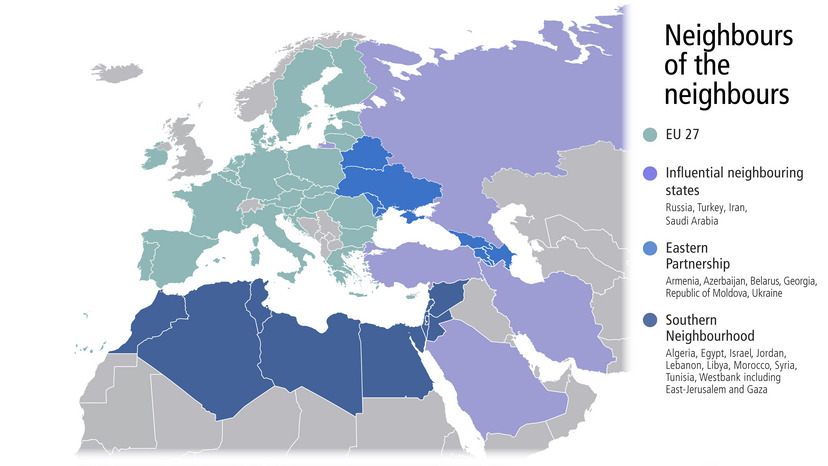Crises, conflicts and wars are destabilizing the neighbourhood and creating challenges for the European Union. Islamist terrorism and transnational criminality do not stop at the EU’s borders. Nor is it possible to prevent masses of people fleeing violence and persecution from seeking refuge in Europe. In addition, we cannot escape the horrific images of misery and mistreatment, bombed cities and thousands of refugees drowning in the Mediterranean that reach us day after day via the media. If we looked the other way, we would throw into doubt our own values and thereby the foundation of our peaceful political order. Therefore, when it comes to the EU’s relations with its neighbours – to slightly alter the famous quote of the 18th-century German writer and philosopher Friedrich Schiller – the EU cannot live in peace if its neighbours cannot also live in peace.

EtiAmmos - stock.adobe.com
Strategies for the EU Neighbourhood
Current crises and conflicts in the EU’s neighbourhood are having a destabilizing effect on the EU and its Member States. We aim to develop proposed solutions for how a European Neighbourhood Policy can effectively influence transformation processes in neighbouring countries in order to increase security, stability and prosperity for all sides.
Content
Developing a stable, well-governed neighbourhood, which simultaneously provides security to its inhabitants while opening up future economic prospects for them, is in the EU’s fundamental self-interest. History to date shows that only democracies lead to genuine stability, both internally and externally. Through its European Neighbourhood Policy (ENP), the EU has been trying since 2003 to encourage and foster transformation processes toward democracy and a social market economy among its eastern and southern neighbours. But, so far, this policy has not been truly successful. Poor governance and a disregard for human rights and civil liberties continue to be the norm. Corruption and the indiscriminate use of state power are likewise widespread. These transformation deficits, in turn, lead to economic stagnation and aggravate the societal tensions that erupt into violence every now and then, thereby making any further progress impossible. In addition, countries such as Russia, Turkey, Iran and Saudi Arabia are undermining the EU’s reform efforts or further heating up conflict situations – such as in Ukraine or Syria – through military interventions.
The “Strategies for the EU Neighbourhood” project aims to develop proposed solutions for how to support democratic and market-economy reforms in the countries neighbouring the EU in a more targeted manner and to thereby improve the EU’s abilities to prevent crises and mitigate conflicts in the region. To this end, five closely related areas of activity will particularly be examined in more detail. Each of these areas of activity is in itself a necessary prerequisite for a successful European foreign, security and development policy.
1. What changes in EU governance are needed to improve European crisis and conflict management?
A successful transformation, like the one the EU is trying to achieve in its neighbourhood, must introduce a new, integrated approach to foreign and security policy that combines the instruments of diplomacy, development and security, which have so far been used in isolation.
⇒ Better Crisis and Conflict Management for the EU
2. How can faith in democracy be created and preserved?
The rule of law is crucial for stable democracy, social justice and domestic peace. Equally important is the confidence that citizens have in state institutions and their representatives. Good governance and the fight against corruption require oversight by both the public and civil society.
3. What opportunities do economic and trade cooperation between the EU and its neighbours hold?
The EU is keen to have its trade policies with its neighbours translate into better economic growth and higher incomes in its neighbourhood. Indeed, modernization and social stabilization will only be achieved there if more citizens benefit from rising prosperity.
⇒ Fair Trade and Economic Integration
4. How can regional cooperation contribute to stabilizing the EU’s neighbourhood and promoting peace in it?
Promoting regional cooperation in places where accession to the EU is out of the question or a long way off should contribute to stabilization and thereby to the development of a prospering and peaceful neighbourhood. The EU anticipates that forming stronger economic and social ties between the states in its neighbourhood will lead to the formation of common interests and thereby help defuse political tensions between hostile neighbouring states.
5. How is the EU confronting new geopolitical challenges?
The (power) interests of the governments of Russia, Turkey, Iran and Saudi Arabia are increasingly contradicting the EU’s transformation agenda and are partly aimed at destabilizing neighbouring countries as well as the EU itself. Fresh ideas are needed for how to deal with Moscow, Ankara, Tehran and Riyadh.
We are developing our reform proposals and policy recommendation in regular “stakeholder dialogues” with political decision-makers, experts, actors from business and civil society, and other multipliers. Our policy papers, country studies and reports reflect this collaboration.







